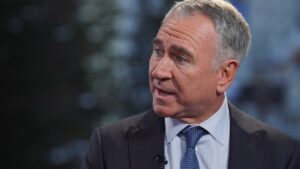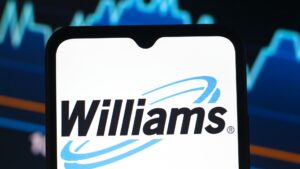Verizon Communications Inc. has emerged as a green-bond heavyweight in the U.S., using its vast network to raise another $1 billion to add more renewable energy to the electricity grid.
The telecom giant’s green-bond financing now stands at $3 billion and counting, with more programmatic issuance expected as Verizon
VZ,
works toward its goal of sourcing 50% of its annual electricity consumption from renewable energy by 2025, and to be net-zero in emissions by 2035.
“Our strategy has been very clear, very straightforward,” said Verizon Treasurer Scott Krohn, in an interview with MarketWatch on Wednesday. “There’s nothing greener than pushing carbon off the grid by adding renewable capacity.”
In less than two years, Verizon has emerged as one of the biggest U.S. corporate buyers of renewable energy.
While proceeds from all of Verizon’s green bonds have been dedicated to advancing the environment, Krohn said the past two debt deals will be 100% dedicated to adding renewable energy. The pair also will include annual reporting to show how funds have been spent and their environmental impact.
“Investors like it because they can see not only the issuance, they can see us putting our money where our mouth is.”
There’s been a surge of green-bond issuance in the past two years, with $1.3 trillion outstanding globally in the first half of 2021, while $1 trillion in new issuance annually is also within reach by 2023, according to the Climate Bond initiative.
With the green-funding deluge also comes heightened scrutiny, including by the U.S. Securities and Exchange Commission and by debt investors wanting more accountability. Borrowers often are able to lock in lower rates from investors wanting to fund environmentally friendly projects, particularly as climate change fuels more extreme weather events, drought and disasters coast to coast.
President Joe Biden on Tuesday said that climate change has become “everybody’s crisis,” while touring neighborhoods in New Jersey and Queens that were ravaged by flooding in the wake of Hurricane Ida.
“You’ve probably read a number of articles in this space where investors are a bit confused about, ‘OK, how is this being allocated? What are the projects?’” Krohn said. “They want clarity about the intended use of proceeds, that there’s actually follow-through.”
More ESG milestones
Verizon’s new $1 billion bond comes as more milestones are hit in the environmental, social and good governance (ESG) category.
Walmart Inc.
WMT,
issued its first $2 billion green bond on Wednesday, a part of a larger $7 billion financing, according to a person with direct knowledge of the dealings. Other notable ESG issuers have been Bank of America Corp.
BAC,
JPMorgan Chase & Co.
JPM,
, Fannie Mae
FNMA,
and Apple Inc.
AAPL,
More ESG bonds likely will flow in the coming weeks as companies take part in a record-setting borrowing blitz to kick off September.
Verizon’s bond was structured with a 20-year maturity, saw some $5 billion of demand from investors and priced at a spread of 102 basis points above Treasurys, Krohn said, or about 23 basis points tighter than initial levels.
Spreads are the level of compensation that bond investors earn above a risk-free benchmark, often Treasurys
TMUBMUSD10Y,
to offset default risks, even as corporate bond spreads hover near post-2008 lows.
Verizon’s latest green bonds also take aim at social, diversity and inclusion issues on Wall Street. The company opted to hire firms that “have historically done a better job of advancing diversity” to complete the financing, Krohn said, noting that three out of four leads on the deal weren’t major investment banks.
In addition to Morgan Stanley
MS,
the lineup of underwriters included Loop Capital Markets, Ramirez & Co., Inc. and Siebert Williams Shank.
“When you think about the environmental and societal, we’ve formalized that linkage,” Krohn said of the new bond deal, adding that it enabled financial firms owned by women, Hispanics and Blacks to submit customer orders to new bond deals, allowing them “to develop that muscle and further their franchise.”
“It’s not just cutting a check, but it’s providing a meaningful opportunity as well,” he said. “The diversity angle is something we hope other issuers copy.”
This post was originally published on Market Watch






